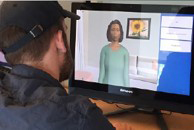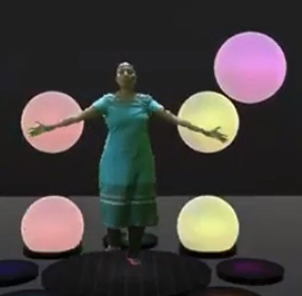 |
Pain/Opioid CORE Veteran Engagement Panel Brings Veterans' Perspective to HSR&D ResearchHSR&D’s monthly publication Veterans’ Perspectives highlights research conducted by HSR&D and/or QUERI investigators, showcasing the importance of research for Veterans – and the importance of Veterans for research. In the March-April 2022 Issue:
|
IntroductionThe Pain/Opioid CORE strives to enhance collaboration and accelerate health services research related to pain (especially non-drug interventions for chronic pain), opioid prescribing, and opioid use disorder.
Chronic pain conditions among Veterans are highly prevalent, can be profoundly disabling, and are often difficult to manage. The US opioid overdose epidemic brought greater attention to the importance of pain management research, as well as research to improve care for people prescribed opioid medications and people with opioid use disorder. VA operations, policy, and research arms have promoted diverse efforts to reduce opioid harms, improve chronic pain outcomes, and increase evidence-based opioid use disorder (OUD) treatment. Despite advances, many questions about chronic pain and opioids remain. To address this, HSR&D funded the Pain/Opioid COnsortium of REsearch (CORE) to enhance collaboration and accelerate health services research related to pain (especially non-drug interventions for chronic pain), opioid prescribing, and opioid use disorder (OUD). Together with their partners, the Pain/Opioid CORE promotes efforts to move research findings into wider use. The four primary goals of the consortium are to:
The Pain/Opioid CORE Veteran Engagement PanelIn 2020, the Pain/Opioid CORE Veteran Engagement Panel (VEP) was established as a resource to connect Veterans with the VA pain/opioid research community and facilitate more Veteran-engaged research. Veterans applied to be a part of the group, and Pain/Opioid CORE staff interviewed and selected 12 individuals to serve on the panel. National in scope, the panel is composed of men and women of different ages and backgrounds and includes students, retirees, and current workers with varied military, volunteer, and professional experiences. In addition, each member brings personal experience with chronic pain, opioid use, and/or addiction. Panel members work as colleagues with Pain/Opioid CORE staff and VA researchers across the US to help provide guidance and feedback on VA research from their perspectives as both Veterans and patients. “I really enjoy learning about the various research projects that the VA sponsors across the nation with the express purpose of helping and supporting other Veterans.” – VEP Member “As Veterans and patients from many different backgrounds and experiences, the VEP can provide practical answers to questions about… [any] study.” – VEP Member Each month, the VEP meets virtually with a different guest research team or operations partner. Prior to the meeting, CORE staff and the guest research team collaboratively develop key questions to elicit constructive feedback on specific aspects of the team’s project. During the two-hour VEP meeting, a trained facilitator leads the discussion with the support of other CORE staff members, who aid in co-facilitating, note-taking, and managing the virtual meeting technology. The research team attends the VEP meeting to interact, observe, and ask clarifying questions of the panel. Several months later, a CORE staff member follows up to find out how the researchers’ visit with the VEP influenced their research. 
Members of the Pain/Opioid CORE Veteran Engagement Panel (VEP) in a virtual breakout session. Clockwise from top left: Kathryn Washington, Becky Keller, Kyle E. Miedema, Evelyn L. Lewis Since its inception, the VEP has met with 15 different research teams including several Pain/Opioid CORE Rapid Start Funding awardees. The panel has provided feedback on various aspects of research including study questions, recruitment materials, text-messaging protocols, study results, and dissemination. The feedback infuses Veterans’ perspectives into the research process, often during early stages, which helps studies to be more successful and meaningful. ["The VEP meeting] was a very useful resource. I learned a lot from the VEP, and they were so insightful and helpful. I really appreciated how diverse the panel is.” – VEP Guest Researcher “The whole process was an incredible experience that will definitely improve the current project and future projects.” – VEP Guest Researcher “This fills a huge gap between the researcher writing a proposal and improving the VHA for the Veteran.” – VEP Guest Researcher
Making a Difference
VEP members get a preview of an online “virtual coach” module to help Veterans track and reach their goals related to pain management. The panel has improved several research projects by applying the perspectives of its Veteran members. It has made a significant difference in the following ways:

VEP members reviewed virtual reality “exergames” for a phantom limb pain pilot study.
To close the feedback loop, a CORE staff member interviews guest researchers months after their consultation with the VEP to find out how the panel’s input was actually used. At least every six months, a short presentation summarizing the longer-term outcomes of VEP feedback is shared with panel members at the beginning of a meeting. “When we get updates on research we’ve reviewed and find out that funding was obtained, or new milestones achieved, then I know we’ve made a difference.” – VEP Member Next Steps
Tracy Sides is the VEP point-of-contact for the Pain/Opioid CORE and a staff member at the Center for Care Delivery and Outcomes Research (CCDOR) at the Minneapolis VA Health Care System. She can be contacted at tracy.sides@va.gov.
The Pain/Opioid CORE VEP remains available to consult with VA researchers studying pain or opioid-related topics and will continue its monthly consultations with guest research teams. More information about the VEP and how to schedule a consultation can be found on the Pain/Opioid CORE website. VEP members and staff are also planning for an in-person meeting this June. The meeting intentionally overlaps with a Pain/Opioid CORE leadership meeting so that the VEP can meet with and provide input on the strategic priorities of the CORE. |